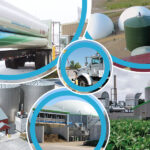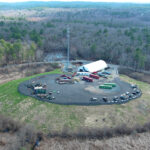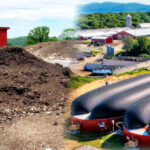Top: Photo courtesy of Seacoast Farms Compost Products, Inc.
The New Hampshire Department of Environmental Services (NHDES) published proposed revisions to the requirements for solid waste composting facilities in the state. “The proposed revisions aim to address the feedback that NHDES has received from stakeholders over the years,” explains Michael Nork, Supervisor of the Materials Management, Education & Planning Section in NHDES’ Solid Waste Management Bureau. “It is our hope that this rulemaking will clarify and simplify requirements for food waste composting and potentially make it easier to develop additional infrastructure for organics diversion in New Hampshire.”
The proposed revisions include new permit exemption provisions for food waste drop-off sites and community composting. Both are targeted at small-scale organics collection and processing operations:
- Env-Sw 408.08, Food Waste Drop-Off Facilities: “No permit shall be required for collection, storage and transfer of source separated food waste” provided the facility stores no more than one cubic yard, or 200 gallons, at any time; uses closed containers for storage that are designed to prevent dispersal of odors, release of leachate, and attraction of birds, insects, rodents and other vectors; and inspects the waste collection and storage areas at least once daily during operating hours. Food waste cannot be stored for longer than a week from date of receipt and must be transferred to an authorized facility for processing or disposal.
- Env-Sw 608.05 Community Composting Facilities: “No permit shall be required for a composting facility that receives solid waste from off-site generators, provided that the aggregate area of the facility’s waste collection, storage and processing areas, including areas used for feedstock mixing and active composting, does not exceed 600 square feet.” In addition, the community composting operation can receive no more than five cubic yards of solid waste (i.e., food scraps) during any 30-day period, and the composting process must be conducted in a manner consistent with “Community Composting Done Right: A Guide to Best Management Practices,” March 2019, published by the Institute for Local Self-Reliance. Facilities meeting these parameters may compost any combination of the following: yard waste or farming crop residuals; source separated food waste, including meat and dairy matter; compostable paper, packaging, containers, bags and serviceware; animal manure; or approved bulking agents.
“The proposed rules also revise the conditions for permit-by-notification (PbN) composting facilities to allow composting of food scraps that include animal proteins (meat, dairy, etc.),” adds Nork. “Under the existing rules, PbN composting facilities are only allowed to compost vegetative food scraps. This means that meat/dairy composting currently requires a standard permit, which is a more complex permitting process compared to a PbN. By allowing meat/dairy composting under a PbN, we hope the proposed rules will make it easier for entities to develop additional composting infrastructure in the state and thereby increase statewide access to organics diversion.”
Two other changes in the proposed rule highlighted by Nork include:
- Revised siting requirements for new composting facilities. “Under the existing rules, a composting facility is required to meet the same siting criteria as a landfill, which is unfair because landfills and composting facilities are not equivalent facilities,” he says. “The proposed rules would break this tie and establish siting requirements specific for composting facilities.” Existing permitted composting facilities would be grandfathered from the new siting requirements.
- Eliminate New Hampshire’s existing compost classification system, which was loosely based on the biosolids Class A/B system developed by U.S. EPA under the Part 503 rules (40CFR Part 503). Instead of a classification system, the proposed rules would set minimum quality and maturity requirements that apply to all finished compost distributed in the state.
Written comments on the proposed rules may be submitted until 4:00pm on December 20, 2021. Additionally, a public hearing is being held on December 13.










